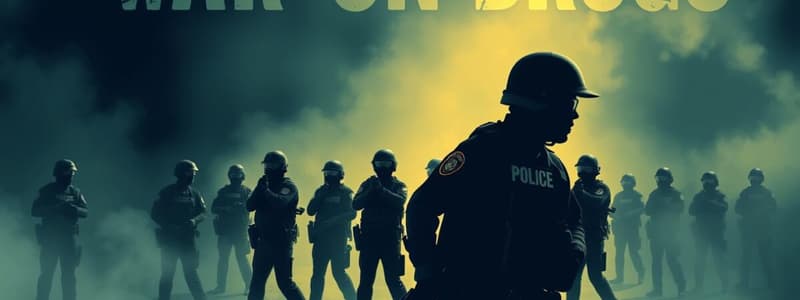Podcast
Questions and Answers
How did arrests rise during the War on Drugs?
How did arrests rise during the War on Drugs?
Operation Pipeline
How has Supreme Court interpretation of the 4th amendment changed with the War on Drugs?
How has Supreme Court interpretation of the 4th amendment changed with the War on Drugs?
drug exception
How has the stop and frisk rule changed? Can you just say no?
How has the stop and frisk rule changed? Can you just say no?
pretext stops, extremely hard to say no
What are pretext stops, and how do they lead to drug arrests?
What are pretext stops, and how do they lead to drug arrests?
What is Operation Pipeline and how has it led to arrests? Is their profiling reasonable?
What is Operation Pipeline and how has it led to arrests? Is their profiling reasonable?
What is the Byrne Program and how did it increase drug arrests? Militarization?
What is the Byrne Program and how did it increase drug arrests? Militarization?
How were SWAT teams used? What happened to Alberta? Scott?
How were SWAT teams used? What happened to Alberta? Scott?
How have cash and asset seizures changed with the War on Drugs? Donald Scott?
How have cash and asset seizures changed with the War on Drugs? Donald Scott?
Do all arrested receive legal counsel? LA? WI? OH? James Thomas?
Do all arrested receive legal counsel? LA? WI? OH? James Thomas?
How do plea bargaining and paid snitches lead to felony status, prison, probation, parole?
How do plea bargaining and paid snitches lead to felony status, prison, probation, parole?
How has mandatory sentencing led to mass incarceration? Judge Jack Weinstein?
How has mandatory sentencing led to mass incarceration? Judge Jack Weinstein?
What civil penalties do felons face?
What civil penalties do felons face?
Why are recidivism rates so high?
Why are recidivism rates so high?
Study Notes
The War on Drugs and Arrest Trends
- Operation Pipeline significantly increased arrests during the War on Drugs by promoting aggressive policing tactics.
- Supreme Court's interpretation of the 4th Amendment evolved to include a "drug exception," allowing for broader search and seizure practices.
Stop and Frisk Practices
- Stop and frisk rules have transitioned to pretext stops, making it extremely difficult for individuals to refuse police requests.
- Pretext stops mostly yield no citations, highlighting their inefficiency and high costs.
Law Enforcement Tactics
- Operation Pipeline has led to profiling practices deemed unreasonable in the context of arrests.
- The Byrne Program militarized law enforcement, equipping police with over 1.2 million pieces of government equipment and training for drug-related activities.
SWAT Team Deployment
- SWAT teams have been utilized without sufficient cause, with local law enforcement focusing on drug offenses due to financial incentives.
- Notable incidents include Alberta, who suffered a cardiac arrest from a grenade explosion, and Scott, who was shot near his child during a police raid.
Financial Aspects of Drug Law Enforcement
- Cash and asset seizure laws have evolved, allowing convicted drug felons the opportunity to pay fines for reduced sentences.
- The case of Donald Scott illustrates the impact of these practices, leading to wrongful legal consequences.
Access to Legal Representation
- In Los Angeles, there are only two public defenders for approximately 7,000 cases, indicating overwhelming caseloads and insufficient legal support.
- In Wisconsin, individuals earning slightly above a threshold lose access to legal counsel, while Ohio shows a staggering 90% of children without representation.
- James Thomas endured an 8.5-year wait for trial without ever being convicted, exemplifying systemic delays in the justice system.
Plea Bargaining and Felony Charges
- Police often overcharge suspects to induce plea bargains, resulting in felony status that carries severe penalties, including prison time and probation.
Mandatory Sentencing and Incarceration
- Mandatory sentencing laws have contributed to mass incarceration, limiting judicial discretion and establishing the U.S. as having one of the strictest drug policies globally.
Post-Conviction Civil Penalties
- Felons face numerous civil penalties including discrimination in employment, denial of food stamps, and disenfranchisement from voting rights.
Recidivism Rates
- High recidivism is linked to barriers imposed by the justice system, where minor infractions can lead to re-incarceration—creating a "revolving door" effect.
Studying That Suits You
Use AI to generate personalized quizzes and flashcards to suit your learning preferences.
Description
Explore the impact of the War on Drugs on law enforcement practices and arrest trends. This quiz delves into Operation Pipeline, stop and frisk rules, and the militarization of police forces. Understand how these tactics have evolved and their implications on civil liberties.




